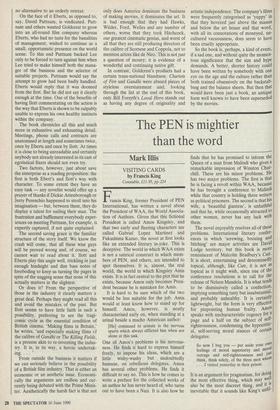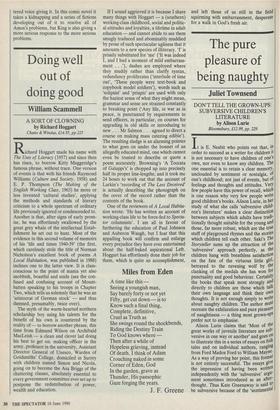The PEN is mightier than the word
Mark Illis VISITING CARDS by Francis King
Constable, £1 1.95, pp.224
Francis King, former President of PEN International, has written a novel about the President of WAA, the World Associa- tion of Authors. Given that this fictional President is called Amos Kingsley, and that two early and fleeting characters are called Gabriel Lopez Martinez and Fukushima Kazuo, the novel at first looks like an extended literary in-joke. This is deceptive. The world in which WAA exists is not a satirical construct in which mem- bers of PEN, and others, are intended to spot themselves. It is, almost, the real world, the world in which Kingsley Amis exists. It is in fact central to the plot that he exists, because Amos only becomes Presi- dent because he is mistaken for Amis.
It is hard to be sure which of the two would be less suitable for the job. Amis would at least know how to stand up for himself. Amos, however, is neatly characterised early on, when standing at a urinal beside a macho American author:
[He] continued to urinate in the nervous spurts which always afflicted him when not alone at this task.
One of Amos's problems is his nervous- ness. He finds it hard to express himself freely, to impose his ideas, which are a little wishy-washy but undoubtedly humane, on rebellious delegates. Amos has several other problems. He finds it difficult to say no. This is how he comes to write a preface for the collected works of an author he has never heard of, who turns out to have been a Nazi. It is also how he
finds that he has promised to inform the Queen of a man from Malindi who gives a remarkable impression of Winston Chur- chill. These are his minor problems. He has two major problems. The first is that he is facing a revolt within WAA, because he has brought a conference to Malindi while that country is holding three writers as political prisoners. The second is that his wife, a 'beautiful giantess', is unfaithful and that he, while occasionally attracted to other women, never has any luck with them.
The novel enjoyably resolves all of these problems. International literary confer- ences in which 'screwing, boozing and bitching' are major activities are David Lodge territory, but this book is more reminiscent of Malcolm Bradbury's Cuts. It is short, entertaining and determinedly topical, although, like Cuts, it is not as topical as it might wish, since one of the conference resolutions is to call for the release of Nelson Mandela. It is what tends to be dismissively called a confection, implying something tasty but insubstantial, and probably unhealthy. It is certainly lightweight, but the form is very effective for pinpointing human frailty. Amos speaks with uncharacteristic cogency for a page and a half on the subject of self- righteousness, condemning the hypocritic- al, self-serving moral stances of certain delegates: So now I beg you — put aside your own feelings of moral superiority and !nova! outrage and self-righteousness and Ps' think, think solely, of the three men whom . . . I visited yesterday in their prison.
It is an argument for pragmatism, for doing the most effective thing, which may well also be the most discreet thing, and it .is inevitable that it sounds like King's unhl- tered voice giving it. In this comic novel it takes a kidnapping and a series of fictions developing out of it to resolve all of Amos's problems, but King is also giving a more serious response to the more serious problems.



















































 Previous page
Previous page